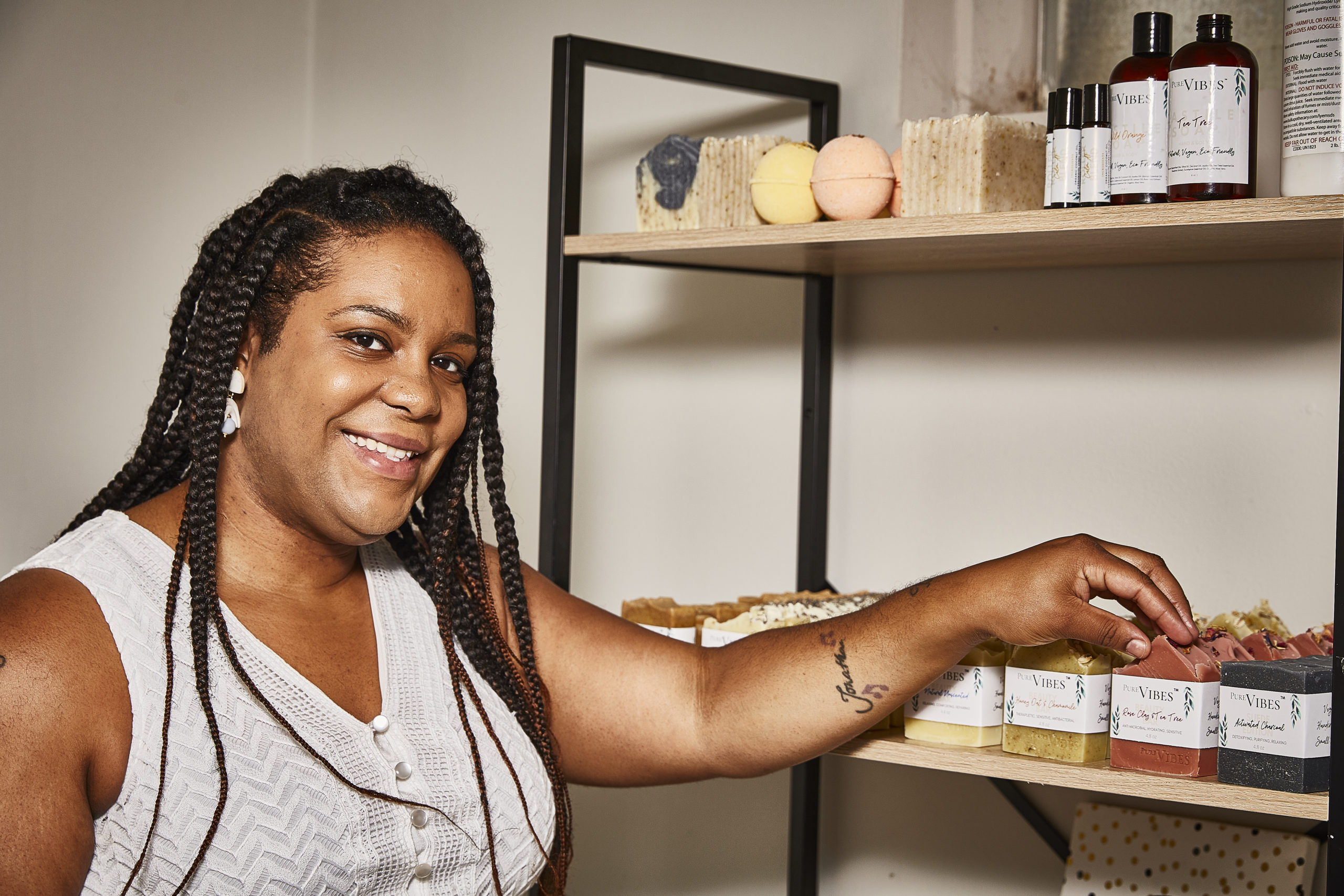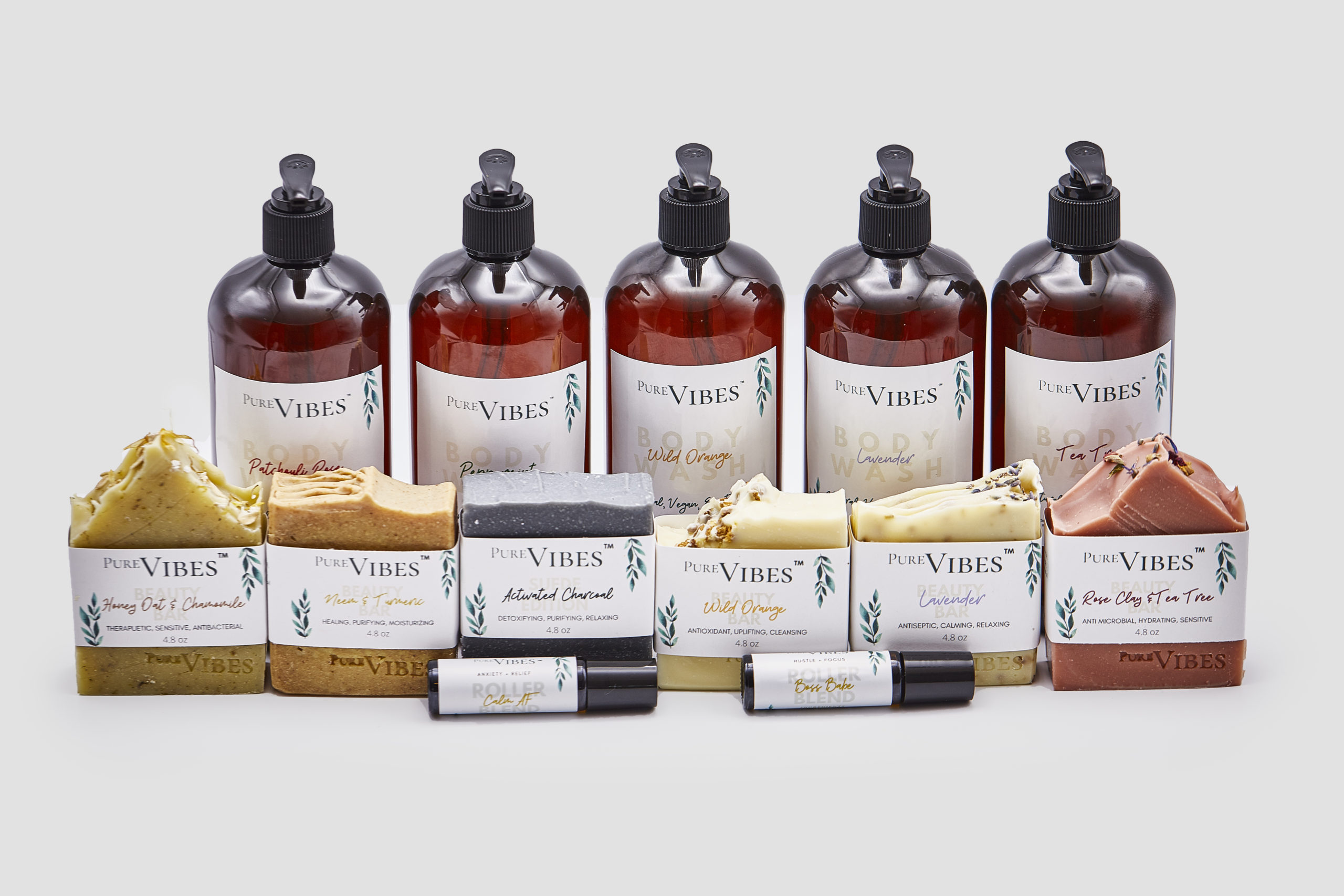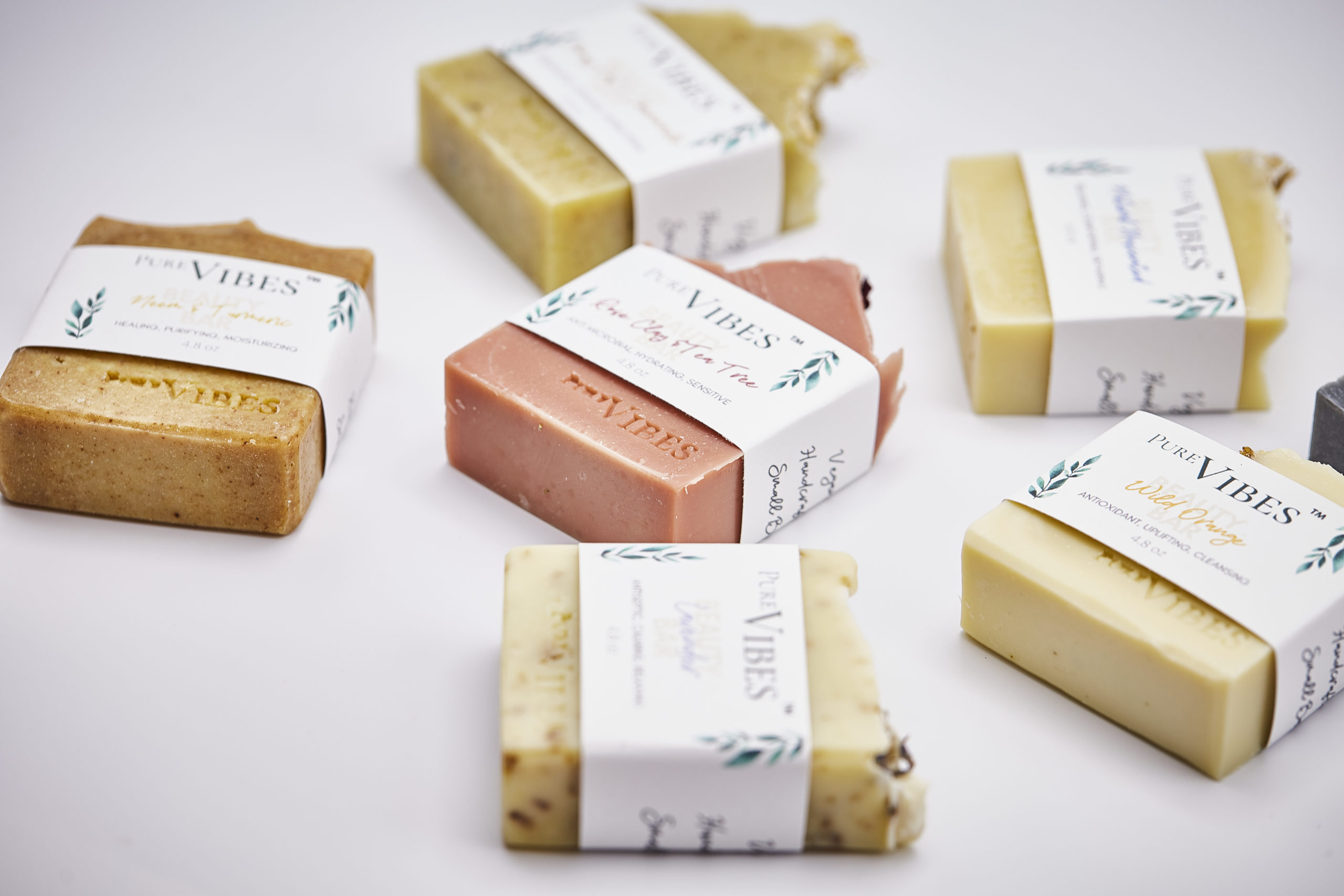Our Dreams Hold Hands
JANUARY 29, 2021
Our Dreams Hold Hands
by Tiffany Wesley with Joey Saunders

I’ve been thinking a lot lately about the interconnectedness of dreams. How our ancestors’ dreams reach out and hold onto, a grandmother’s, a father’s, his daughter’s. I feel so grateful as my dream — starting my business, Pure Vibes, and seeing it grow and bloom— becomes a reality. It felt important for me to reflect on how I’ve come to be where I am today and what I can do to encourage my brothers and sisters in entrepreneurship to hustle for their dreams.
I think my dream has always been to be an entrepreneur but, where I grew up, I don’t remember anyone ever really putting that picture in front of me for me to point at and say, “yes, that!” And certainly, outside of maybe Oprah, you didn’t see many Black women succeeding in business so it wasn’t something I felt encouraged to do. I was born in North St. Louis City in what felt like an ocean of mothers hustling, not for their own dreams, but for survival. I knew the area I grew up in was supposedly infested with drugs and crime, but those weren’t the “dangers” that I was constantly warned about. The way my family matriarchs told it, nothing could shatter a girls’ dreams quite like teen pregnancy.
I was the oldest of three, my mom was single and worked constantly so I grew up fast taking care of my siblings. Whenever I could have a little break, nearly every weekend, I loved going over to visit my aunt and grandmother. I love them both dearly, and I consider them excellent female role models, but they were quick to point out that all my girl cousins were pregnant by 13 and no men to help out. They doted on me and called me the family’s “golden child,” but it was as nerve-wracking as it was flattering. It felt like I had the weight of so many derailed dreams around my neck. I felt pressured to be perfect. And so, I understand how they thought they were doing what’s best for me when they put me on a birth control shot, Depo-Provera, well before I was sexually active. I don’t think any of us fully considered the cost of the side effects, particularly those I would encounter later in life.
Still, it worked, so like with most things in life, there are trade-offs. For example, with the pressure of being the “golden child” came opportunities. By the time I finished eighth grade, my mom sort of tagged-team out with my father and I went to stay with him and go to Hazelwood West High School. Living with him was like a different world where I could be young and focus on school instead of helping run a household. He had worked hard to become a business analyst for a big insurance company and he made sure I knew it. He instilled a hustler spirit in me. He bet on my success. “If you get straight As, I’ll buy you a car.” Boom. Done. Car at fifteen before I even had a permit. “Try everything! Be fearless!” And I did, with very little exaggeration, every extra-curricular activity I could from running track and dancing in the salsa club. When I earned all these letters, he said, “You want to wear them on a ridiculously expensive letterman’s jacket? Earn an A-Plus Scholarship.” And you know when I won it, I wore it with pride. “Tiffany, if you keep your eyes open, fixed on something, and you work for it with everything you got, you can achieve anything.”
Even with my dad being like an inspirational Instagram quote in human form, my true dream still hadn’t quite clicked for me. I think I saw Black women as achieving success only in spaces where they could still be considered a kind of caretaker and, in my mind, the business world seemed disconnected from that at that time. When I finally left my dad to attend Lincoln University I decided to study political science I thought maybe I would eventually study law as a way to help people while also still tapping into my ambitious hustler spirit. I took an internship with a Missouri State Representative and was incredibly discouraged by the corruption I witnessed. I wondered if maybe my dad’s dream-it-do-it rhetoric had lent too much rose-tint to my glasses. It made me reconsider everything.

If that was the real world way to hustle, I figured, maybe I should lean more into the trope of Black-woman-as-caretaker. I applied to Lincoln’s nursing program. At the time, there was a two-year admittance period where you needed to meet a number of prerequisites. I was a typical young person, I’d been so conditioned to achieving things quickly with hard work and two years seemed like an eternity, so I packed up and moved back to St. Louis. I tried to keep my head held high, but doubts crept in. I felt like I was getting more and more tired; maybe the truth was I wasn’t a hustler. In my family, my school, my neighborhood, maybe I was something, but out in the real world, maybe I didn’t have what it took. Maybe I’d really been lazy all this time. But something else was going on.
I was diagnosed with Polycystic Ovarian Syndrome, or PCOS. It’s a surprisingly common hormone imbalance that affects about one in ten women, yet there’s no cure and still relatively limited research. It can lead to several health risks as well as physical and mental symptoms that were personally challenging for me before I was on medication. The diagnosis came at a low point in my life; it was difficult, but in some ways it was a comfort to finally put a name to this and understand that I wasn’t lazy, I was suffering from something that I could research and try to overcome. Once I was in St. Louis, I got my EMT and paramedics license. There was a lot I enjoyed, but it still felt like a betrayal of who, essentially, I was. And my dream self came into focus: I will be an entrepreneur. And a mother.
It’s funny, I was so sure that this was what I wanted and who I wanted to be, but the how was still foggy. Maybe it was because I’d spent so much time in firehouses in my EMT-days and they were a certain-kind of male dominated environment so I ran in the opposite direction and set my sights on opening an online women’s boutique. As far as the mother bit goes, I’d fallen in love with my now-husband, Casey, and I decided it was time to shed the idea that motherhood would get in the way of my dreams when it so clearly was part of what I wanted. My aunt and grandmother’s good intentions came with costs. The years I’d been on birth control shots took a toll. One of the side effects, weight gain, helped another side effect, temporary infertility, take hold longer than it might have otherwise. Getting pregnant became much more challenging for me than I had been led to believe it was in my days as a young girl when my grandma had given me the impression that making eye contact with a boy for too long could cause instant belly swelling. My PCOS and the aftermath of years on Depo-Provera became a kind of perfect storm. When Casey and I finally conceived, the pregnancy was considered at-risk.
As my baby grew inside me, even if I was made to lay around being cautious, I spent all my down time researching.
“Honey, it’s four in the morning.”
I’d tell Casey, “I know, baby,” but I needed to finish that next article to figure out how to start my business, get an EIN, an LLC, whatever it was I devoured it. I found out it cost $50 to file in Missouri as an LLC (a limited liability corporation) and get my business running. I didn’t have two pennies to rub together at the time, but my husband loaned me the $50. I knew where I wanted to buy inventory from. I didn’t have any money to actually stock products, but I did have a plan. I got a free trial to a website maker, I copy and pasted photos of the products I wanted to sell, then I told everyone who would listen to me on social media, at the store, co-workers on their lunch breaks, that I was launching this boutique. And people actually bought stuff! Well, technically, they bought pictures of stuff at first, since I had no inventory. But, I marked the products up enough so half of the revenue could go toward buying from the wholesale supplier and shipping to customers and the other half could be reinvested into the business.
I was proving I could be an entrepreneur and a mom even in the face of health obstacles and the tragedy that accompanied them. After losing two babies, I am fortunate to have given birth to two beautiful children, now two and six years old respectively, and be a stepmother to a third. As I contemplated my day to day challenges with PCOS, and the knowledge that millions of women faced the same or similar challenges, a more personal business venture emerged.
When I’d started the online boutique, it seemed slightly ahead of the curve but the marketplace started to feel oversaturated so I embraced the opportunity to pivot when the proverbial lightbulb appeared overhead. In addition to the heightened risks of developing diabetes and heart disease, PCOS is a skincare nightmare and the research is frustratingly limited when you consider the number of women affected. As a result, my skin is easily inflamed and sensitive to gluten but I didn’t have a lot to go off of what would trigger it or be best for it. So, I went on a kind of self-care quest to figure out what sorts of products worked best to cleanse, soothe, and nurture my skin and the skin of so many people like me. Brands using mostly synthetic ingredients didn’t work for me and pseudo-natural brands like LUSH were just as bad with all the irritating dyes, fragrances and, in some cases, even glitter that their products packed. So, I decided to create my own line of essential plant-based skin and self-care products. This is how Pure Vibes was born.
I poured all of my hustler spirit into getting Pure Vibes up on its feet, it was such a deeply personal manifestation of my dreams, so I didn’t want to just get it up and running, I wanted to see it soar. I jumped at the chance to apply to WEPOWER’s Elevate/Elevar business accelerator for Black and Latinx entrepreneurs. It seemed like the perfect opportunity to take Pure Vibes to the next level. I was devastated when I wasn’t accepted.
I almost never get emotional, but I was in tears with my friend going over and over my application trying to figure out how I could have improved, feeling like I grinded so hard and was frustrated that I’d fallen short. Then, I got a call that one more spot had opened up.
I was thrilled, but I also had this feeling that I was this underdog who needed to work extra hard to prove herself. The cohort was already three days in, which may not sound like a lot, but the Village Capital curriculum WEPOWER uses is bursting with indispensable business know-how so I felt like I had a lot of catching up to do.
My initial feelings of not belonging or feeling like I didn’t deserve to be there as much as the others and feeling overwhelmed by the pace and depth of the curriculum quickly melted away. They were replaced by feelings of support and healthy competition that drove me to be the best I could be. I hadn’t felt this energized by learning since those early days when I was pregnant in bed Googling how to start a business. This was like that multiplied by a thousand and coursing with the electricity of new possibilities and deeper understanding of how to push my dreams further.
Through WEPOWER Accelerator I made friendships with business owners who look like me, discovered concepts I’d never thought of, unlocked key relationships with mentors and investors, gave the Pure Vibes brand a much-needed glow-up, and accessed capital that, thanks to institutional racism, is too often out of reach for Black and Latinx entrepreneurs.
I always felt like I could bring my whole self into WEPOWER Accelerator spaces in a way that’s tragically unique in the current business world. I didn’t have to worry about the little things — talk this way, dress that way, wear my hair like this, shrug off that ignorant comment, etc. — that starts to add up and weigh on how you present and function. It was like I hadn’t realized what thick skin I’d needed to grow and how cracked and worn it had become being a Black woman having to function in the harsh environment of an ecosystem dominated by straight white men. Elevate/Elevar became like a Pure Vibes body butter, and its key nourishing ingredient was affirming and celebrating my Blackness.
I’m not exaggerating or saying this just because I’ve been asked to share my story here: WEPOWER changed my life. If you’re a Black and Latinx entrepreneur, I can not recommend WEPOWER Accelerator highly enough. Take a deep breath, shrug off your uncertainties, and apply now! I know it’s a cliche, but the adage “you miss 100% of the shots you don’t take” is so true. Take this shot. You won’t regret it. I’m so excited for the next cohort to be intimidated by and then slowly fall in love with Keisha Mabry and her Motherboard and to be constantly challenged to learn and bring their hustle.

It’s thanks to WEPOWER Accelerator that I’ve raised $45,000 including grants just this last year, I was able to crowdfund an $8,000 interest-free loan through WEPOWER’s partnership with Kiva, and I’m about to close on a $60,000 SBA community advantage loan through their partner, Justine Petersen. But one of the most valuable contributions from Elevate/Elevar was the way it helped shift my mindset and make Pure Vibes worker-owned.
WEPOWER destroyed the myth that caregiving and entrepreneurialism are mutually exclusive paths. Business, I’ve learned, doesn’t need to be a ruthless endeavor, it can center equity and justice. I’ve come to understand and appreciate new flavors of capitalism. I consider myself a capitalist while also holding firm to beliefs WEPOWER Accelerator helped me define. If your flavor of capitalism is all about everyone working for one man at the top, hoarding wealth while so many others skitter around fighting over what’s left, working to survive, not able to build any wealth for themselves, well, there’s only so long that flavor can be shoved down folks’ throats before they spit it out and demand something palatable. Eventually, a system like that is bound to default on itself.
With these insights, I was shocked, when we started learning about different exit strategies (an entrepreneur's strategic plan to sell their ownership), that I’d never thought of a co-op model. Pure Vibes is now completely worker-owned and I think, beyond the natural ingredients, that’s really the heart of who we are as a business. It would be difficult for me to authentically call Pure Vibes a self-care brand without working to make Pure Vibes a replenishing force for community wealth-building. WEPOWER has helped me do that.
This evolution of Pure Vibes has made me both proud and reflective particularly when it comes to the interconnectedness of dreams. If Charli had never dreamed up WEPOWER, I’m not sure that Pure Vibes would have been in the position it’s in now. But she did, and my grandmother’s dreams for “her golden grandchild” and my father’s hustler dreams helped mold me into the woman who dreamed up Pure Vibes, and now my company is poised to make others’ dreams come true. In this way, our dreams hold hands. If we neglect them, they can drag others down. Or, we can grind and hustle and climb on the dreams of those who’ve come before us reaching back, always, to pull a community of dreamers ever forward.
